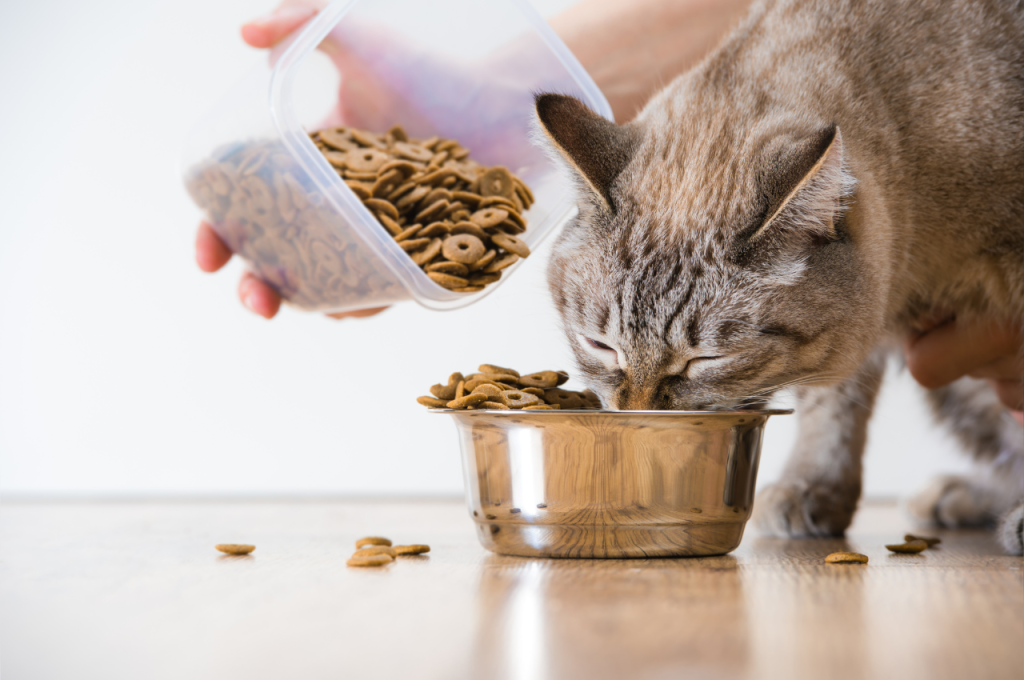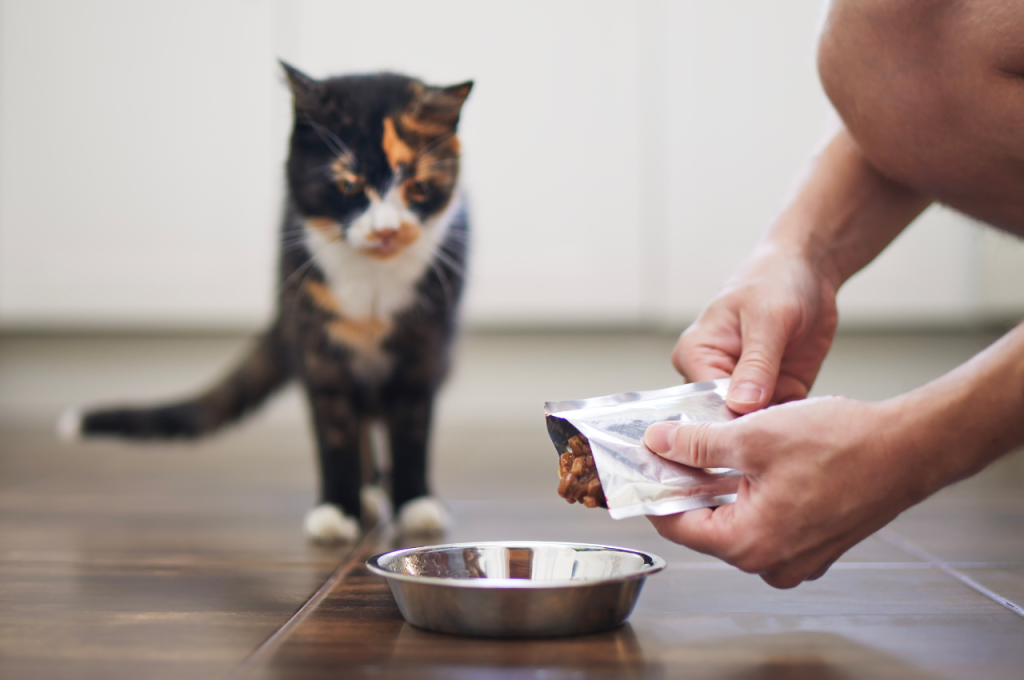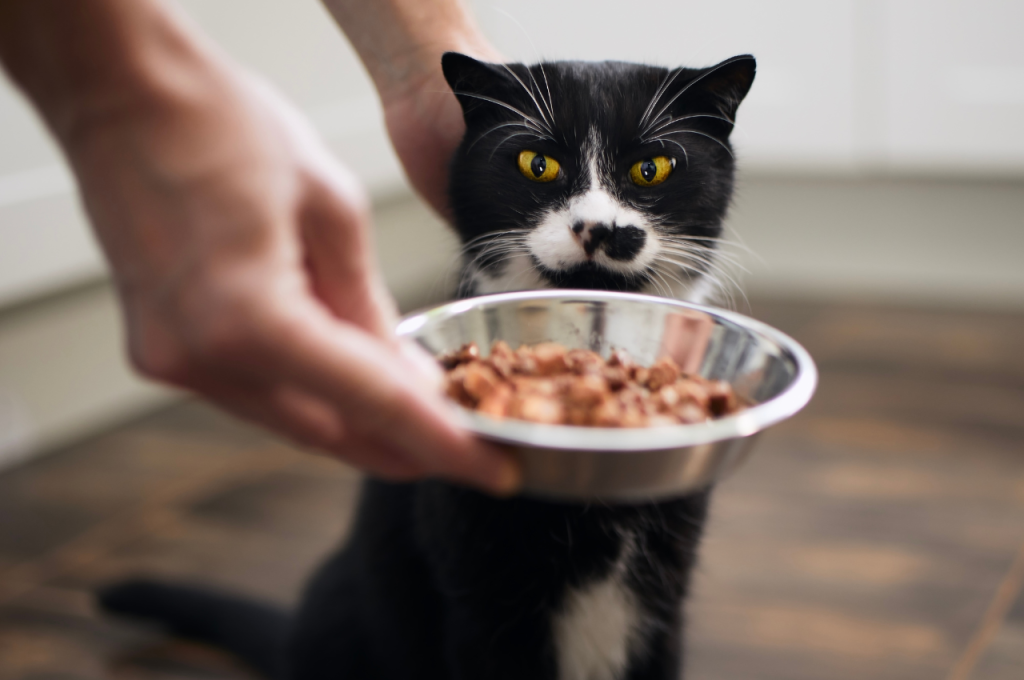The healthiest thing to feed a cat is a balanced diet of high-quality protein, healthy fats, and essential nutrients in appropriate quantities. Providing your feline friend with a diet that meets their nutritional needs is crucial for their overall health and well-being.
A well-rounded diet should include meat-based protein, essential fatty acids, vitamins, and minerals to support healthy growth, development, and maintenance of your cat’s body functions. However, it’s important to consult with your veterinarian before making any changes to your cat’s diet, especially if they have any health conditions or dietary restrictions. We’ll discuss the health benefits of a balanced diet for cats and how to choose the best food for your furry friend.
Introduction To Feline Nutrition
Proper nutrition is essential for maintaining your cat’s health, energy, and longevity. Cats are obligate carnivores, meaning their diet must primarily consist of animal-based proteins to meet their nutritional needs. High-quality cat food rich in essential amino acids, such as taurine, and other nutrients like vitamins and minerals, is crucial for their well-being.

A balanced diet supports muscle development, healthy skin, and a shiny coat, while also aiding in digestion and immune system function. In addition to protein, cats require specific fats and a small amount of carbohydrates for energy. Always ensure your cat has access to fresh water, as hydration is critical for preventing urinary and kidney problems. Understanding feline nutrition helps promote a healthier, happier life for your cat.
The Importance Of Diet In A Cat’s Life
Cats’ health greatly depends on their diet. Proper nutrition is essential for their overall well-being. A balanced diet supports their immune system, helps maintain a healthy weight, and prevents diseases. Feeding cats the right food is crucial for their long-term health and can impact their energy levels and coat condition. A well-planned diet can also reduce the risk of obesity and related health issues.
Key Nutritional Needs Of Cats
Cats require a diet high in animal protein, essential amino acids, and vitamins such as A and D. The right balance of fats and carbohydrates is also important for their energy needs. Taurine is crucial for their heart and eye health, and omega-3 fatty acids support their skin and coat.
Water is vital for cats, and they should have access to fresh, clean water at all times. Balanced nutrition is essential for maintaining their urinary tract health and preventing kidney issues.
Comparing Wet And Dry Food
Cats have specific dietary needs, and the debate between wet and dry food has been ongoing. Let’s delve into the benefits of each to determine the healthiest option for your feline friend.
Benefits Of Wet Food
- Hydration: Wet food has high moisture content, helping to keep cats hydrated.
- Nutritional Value: Offers essential nutrients and proteins vital for a cat’s health.
- Weight Management: Helps in weight control due to lower carbohydrate levels.
Advantages Of Dry Food
- Dental Health: The crunchy texture can aid in reducing plaque and tartar buildup.
- Convenience: Convenient to store and feed, especially for pet owners with busy lifestyles.
- Cost-Effective: Often more affordable than wet food, making it a budget-friendly option.
Essential Nutrients For Cats
When it comes to keeping your feline friend healthy and happy, providing a well-balanced diet is essential. Cats have specific nutritional needs that must be met to ensure their overall well-being. By understanding the essential nutrients that cats require, you can make informed choices about what to feed your furry companion.
Proteins And Amino Acids
Cats are obligate carnivores, which means they require a diet rich in animal protein to thrive. Proteins provide the building blocks for various bodily functions, including muscle development, tissue repair, and the production of enzymes and hormones. Amino acids are the smaller components that make up proteins, and they play a crucial role in your cat’s overall health.
When selecting cat food, make sure it contains high-quality animal proteins such as chicken, turkey, or fish. These proteins contain all the essential amino acids that cats need for optimal health. Avoid foods that primarily rely on plant-based proteins, as they may not provide the complete amino acid profile that cats require.
Fats: Types And Benefits
Fats are an important source of energy for cats and also serve several other vital functions. They help with the absorption of fat-soluble vitamins, provide insulation and protection for organs, and contribute to healthy skin and a shiny coat.

When it comes to fats, it’s important to distinguish between healthy fats and unhealthy fats. Healthy fats, such as omega-3 and omega-6 fatty acids, are beneficial for cats. These fats support a healthy immune system, promote brain development, and help maintain a healthy coat and skin. Look for cat foods that contain sources of healthy fats, such as fish oil or chicken fat. Avoid foods that contain excessive amounts of unhealthy fats, such as saturated fats or trans fats.
Vitamins And Minerals
Vitamins and minerals are essential for cats to maintain proper bodily functions and support overall health. They play a role in various processes, including immune function, bone health, and energy metabolism.
Here are some key vitamins and minerals that cats need:
| Vitamins | Minerals |
| Vitamin A | Calcium |
| Vitamin D | Phosphorus |
| Vitamin E | Potassium |
| Vitamin K | Magnesium |
These vitamins and minerals can be found in a well-balanced diet, but it’s always a good idea to consult with your veterinarian to ensure your cat’s specific needs are being met.
The Debate On Raw Diets
Cats are obligate carnivores, which means their diet should primarily consist of meat. This has sparked a debate about the healthiest diet for felines, with raw food diets being a contentious topic among pet owners and veterinarians.
Pros Of A Raw Food Diet
- Nutritional Value: Raw diets mimic a cat’s natural diet, providing essential nutrients.
- Dental Health: Chewing on raw meat and bones can help maintain dental health.
- Improved Coat: Many cat owners report that a raw food diet leads to a shinier and healthier coat.
Cons And Risks Of Raw Feeding
- Bacterial Contamination: Raw meat can be contaminated with harmful bacteria such as Salmonella.
- Nutritional Imbalance: It can be challenging to ensure that a raw diet provides all necessary nutrients.
- Choking Hazard: Bones in a raw diet can pose a choking hazard for cats.
Homemade Cat Food
Homemade cat food can be the healthiest option for your furry friend, as you can control the ingredients and avoid harmful additives. A balanced diet with high-quality protein sources, essential fatty acids, and necessary vitamins and minerals can help maintain your cat’s overall health and well-being.
Recipes And Ingredients
Making homemade cat food can be a healthier alternative for your furry friend.
Safety And Preparation Tips
Ensure your homemade cat food is balanced and meets your cat’s nutritional needs.
Special Dietary Considerations
Opt for a balanced diet rich in protein and essential nutrients to ensure your cat’s well-being. Incorporate high-quality commercial cat food or consult a veterinarian for specialized dietary recommendations. Remember, proper hydration is key for a healthy feline diet.
Dealing With Food Allergies
Cats can be allergic to certain types of food, just like humans. It’s essential to be aware of the signs and symptoms of food allergies in cats. Some common symptoms include skin problems, vomiting, diarrhea, and even respiratory issues. If you notice any of these signs, it’s crucial to take your cat to the vet immediately. The best way to prevent food allergies is to introduce new foods gradually and monitor your cat’s behavior. If you’re unsure about what to feed your cat, consult with a veterinarian. They can recommend appropriate food based on your cat’s age, weight, and health status. Additionally, you can look for cat food that is specially formulated for cats with allergies.
Age-related Nutritional Needs
As your cat ages, they’ll need different nutritional needs. Senior cats require food that is high in protein and low in calories. Additionally, it’s essential to monitor their weight and make sure they’re not gaining too much weight. Overweight cats are at risk of developing health issues such as diabetes, heart disease, and joint problems.
On the other hand, kittens require food that is high in protein and fat to support their growth and development. It’s crucial to feed your kitten a balanced diet that meets their nutritional needs. Consult with a veterinarian to determine the appropriate food for your kitten. In conclusion, special dietary considerations are essential for keeping your cat healthy. If you suspect your cat has a food allergy or if they have age-related nutritional needs, consult with a veterinarian. They can help you choose the right food for your cat and ensure they’re getting the nutrients they need to thrive.
Choosing The Right Food For Your Cat
Cats require a balanced diet to thrive. Here are some key considerations to keep in mind when selecting the healthiest food for your feline friend:

Factors To Consider
- Quality of Ingredients: Opt for high-quality protein sources like chicken or fish.
- Nutritional Balance; Ensure the food provides essential nutrients like vitamins and minerals.
- Life Stage: Choose food tailored to your cat’s age and activity level.
- Health Needs: Consider any specific health concerns your cat may have.
Reading And Understanding Food Labels
It’s crucial to know how to decipher cat food labels to make informed choices. Look for:
- Named Protein Source as the first ingredient.
- Complete and Balanced for all life stages.
- Avoid artificial colors, flavors, and preservatives.
Conclusion
To ensure the healthiest diet for your feline friend, it is important to prioritize their nutritional needs. Opt for high-quality, protein-rich cat food that is specifically formulated for their age and condition. Avoid feeding them excessive amounts of treats or human food, as these can lead to obesity and other health issues.
Regularly consult with your veterinarian to determine the best diet for your cat’s individual needs. By providing them with a balanced and nutritious diet, you can help promote their overall health and well-being.
